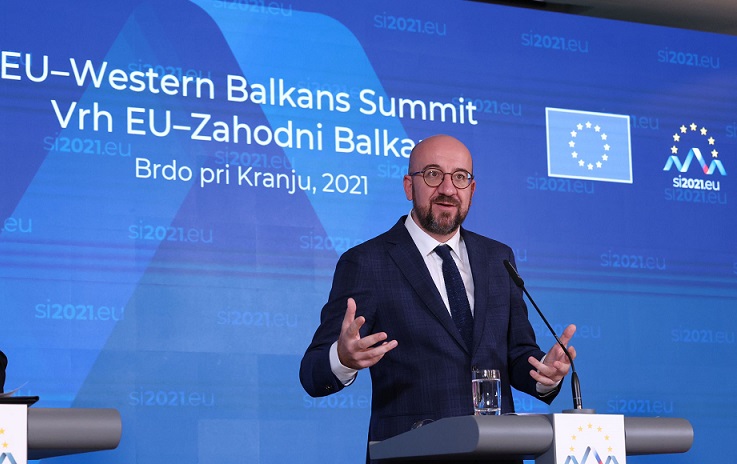EU leaders reiterated on Wednesday that Western Balkan countries belonged in the EU and that they understood their frustration with the slow enlargement, but again failed to give a time frame for their accession. European Council President Charles Michel said the EU’s presence must be more tangible and more visible in the Balkans and that there was a debate within the EU on its capacity to accept new member states.
Michel said the rule of law and reforms were paramount to the progress of the Western Balkans toward EU membership, as were investments. He said the Commission approved of an “unprecedented amount of money” to facilitate regional cooperation.
Cooperation, he said, was key to the countries’ common future. Highlighting the EU’s priorities, including the Green Deal, he said that progress toward them would help the Western Balkans feel the benefits of the partnership with the EU.
Another point he made was that the leaders had “a lively, impassioned debate” on conflicts left over from the past and linked to questions about minorities and their treatment in different countries.
“We had a broad discussion on that,” he said, “and we were able to say that we wanted to see progress made.”
“We are willing to bear our share of the responsibility by encouraging and facilitating the different stakeholders to act responsibly,” Michel continued, “but we need political decisions in the countries to see progress.”
The EU and Southeast European countries’ leaders met in Brdo pri Kranju, Slovenia, to discuss stronger EU engagement in the region’s economic recovery and sustainable development, intensifying the political dialogue, and regional and security cooperation. The focus was on those countries’ European prospects.
In a declaration adopted afterwards, the EU reaffirmed “its unequivocal support for the European perspective of the Western Balkans and welcomes the commitment of the Western Balkans partners to the European perspective, which is in our mutual strategic interest and remains our shared strategic choice.”
“The EU reconfirms its commitment to the enlargement process and its decisions taken thereon, based upon credible reforms by partners, fair and rigorous conditionality and the principle of own merits.”
“We will further intensify our joint engagement to take forward the region’s political, economic and social transformation, while acknowledging the progress made by the Western Balkans. We also recall the importance that the EU can maintain and deepen its own development, ensuring its capacity to integrate new members,” reads the declaration.
However, the document makes no mention of a time frame for the Western Balkan countries’ accession.
Council of the EU chair Slovenia wanted the declaration to state 2030 as the deadline for their EU accession, but this initiative seemed unrealistic given that the countries are not making equal progress.
The EU announced €30 billion in aid for the region for economic recovery and investment.
Commission President Ursula von der Leyen reiterated that the EU and the Western Balkans shared the same history, interests and values, and hopefully fate.
The EU is not complete without the Western Balkans. Without a doubt, our goal is enlargement, she said.
Von der Leyen said she understood the countries’ frustration with the slow progress to EU membership and that the lack of a decision on opening negotiations with North Macedonia and Albania undermined the EU’s credibility.
Some member states, including Croatia, Slovenia and Austria, warn that due to insufficient care by the EU, Europe’s southeast could fall under Russian and Chinese influence, while the other side, led by France, is generally for enlargement but without the ambition to step up the process.
Macedonia and Albania still don’t know when their accession negotiations will begin.
Macedonia ended a years-long dispute over its name with Greece and agreed to change it to draw closer to EU membership. Now it is being blocked by Bulgaria, which wants it to admit that the Macedonian identity and language are of Bulgarian origin.
Serbia began accession negotiations in 2014. Besides reforms, Serbia-Kosovo relations will be crucial for its drawing closer to membership.
Kosovo Prime Minister Albin Kurti reiterated today that the mutual recognition of Kosovo and Serbia was a long term, just and sustainable solution.
Kosovo, a potential membership candidate, has not been recognized by EU member states Cyprus, Greece, Slovakia, Romania and Spain.
Montenegro has been negotiating accession nine years now and is closest to joining the EU, while Bosnia and Herzegovina is yet to meet the requirements for obtaining candidate status.
Source: Hina/MIA




Comments are closed for this post.